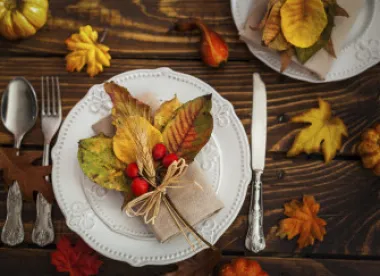It seems especially important to celebrate the people and events that we care about after all that has been endured this year. Holidays are one of the ways we celebrate, but holidays need to look different in 2020. COVID-19 can spread easily from one person to another during routine activities. Traditional holiday activities, such as workplace parties and family gatherings, are no exception. Bringing together employees, family members (including pets) and friends increases the risk of spreading COVID-19. To mitigate this risk, the U.S. Centers for Disease Control and Prevention (CDC) published updated guidance on November 12, 2020, for holiday celebrations and small gathering as well as guidance for Thanksgiving celebrations.
Celebrate Holidays Virtually or Limit Celebrations to Single Households
The CDC recommends celebrating virtually (i.e., through phone and video chat) or limiting celebrations to personal households. Personal households include individuals who currently live and share common spaces in an apartment or house. People who do not currently live in the same household, including college students who are returning from school for the holidays, are considered to be from different households. Those individuals can be included through interactive virtual experiences. Virtual celebrations also are ideal for the workplace, especially with the continuation of remote work arrangements.
Host and Attend In-Person Gatherings Responsibly
When hosting or attending holiday gatherings in the workplace or at home, take preventative measures to keep everyone safe. Guidance includes these safety steps:
-
Check the COVID-19 infection rates in the area of the gathering to determine if it is safe to host or attend the celebration in person.
-
Limit the number of individuals in attendance to enable social distancing.
-
Host the celebration outdoors.
-
Require attendees to wear face masks whether the celebration takes place indoors or outdoors.
-
Avoid physical contact, including hugs and handshakes, with individuals outside one’s personal household.
-
Avoid touching shared surfaces whenever possible.
-
Encourage attendees to wash their hands often with soap and water or to use hand sanitizer.
-
Plan ahead and ask attendees to avoid contact with people outside their personal households for 14 days before the in-person gathering.
-
Treat pets as you would any other family member and limit their interactions with people outside of the personal household.
Follow Food Safety Practices
While the CDC acknowledges that there is no evidence to suggest that eating food is associated with directly spreading COVID-19, touching food, food packaging, plates or utensils poses the risk of infection if the object touched has the virus on it. The CDC recommends following food safety practices to reduce the risk of infection. The safety practices are advisable for workplace gatherings as well as in-person home gatherings.
Avoid Travel or Practice Travel Safety
Travel increases the chance of spreading COVID-19, so the CDC recommends staying at home as the best safety practice. Where travel is desired or necessary, the CDC recommends the now-familiar safety measures: wear a facemask in public, including when using public transportation; maintain social distancing by staying at least six feet apart from others; wash hands often; and avoid touching the face, eyes, nose and mouth. In addition, many states have issued travel advisories with recommendations for individuals traveling from and returning to their home states from states or other destinations with increasing rates of COVID-19 to self-quarantine for 14 days. Check the travel advisories as a first step to planning out-of-state travel to help assess the risks and consequences of travel, including an inability to return to the workplace for 14 days.
Self-Quarantine If Exposed to COVID-19
Self-quarantine is recommended for individuals exposed to COVID-19 during holiday celebrations. The quarantine should last for 14 days after contact with a person who has COVID-19. The 14-day period is recommended because symptoms of the virus (e.g., fever, cough or shortness of breath) may appear 2 to 14 days after exposure, and some infected individuals never have symptoms but are still contagious.
With Thanksgiving and the winter holidays upon us, it is natural to want to forget about COVID-19, put social distancing behind us, and celebrate with our colleagues, families and friends. Traditional workplace and home holiday activities may help spread the virus. While it is tempting to get together and celebrate as we have in the past, it is important to follow CDC guidance and choose activities with less risk to avoid giving the unwanted gift of COVID-19 to employees, families and friends. Skipping the mistletoe this year, a workplace best practice, also is advisable.



 />i
/>i

